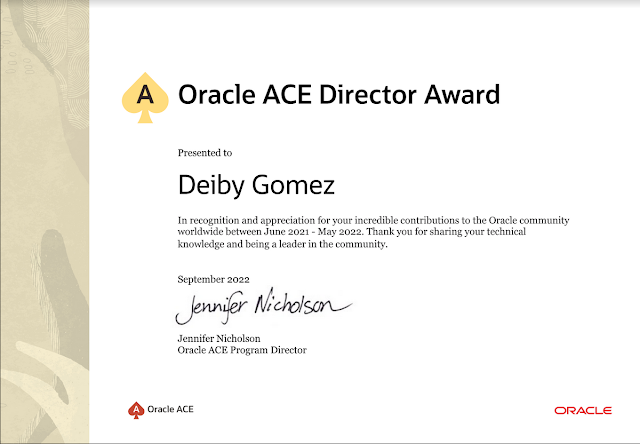Thanks #OracleACE
Program for this awesome certificate recognizing the work I have done
in the community for the last year. Looking forward to learn and share
more content about Oracle Technology!
Thanks #OracleACE
Program for this awesome certificate recognizing the work I have done
in the community for the last year. Looking forward to learn and share
more content about Oracle Technology!
Starting in Oracle 21c, we can use the parameters INCLUDE and EXCLUDE in the same job for expdp. Before this you were able to use only one of these parameters for the same job.
In the following example, I will export the table DGOMEZ.TABLE2 and excluding the table DGOMEZ.TABLE1:
[oracle@localhost ~]$ expdp system/system@localhost:1521/pdb11 exclude=table:"IN('TABLE1')" include=table:"IN('TABLE2')" schemas='DGOMEZ'
Export: Release 21.0.0.0.0 - Production on Mon May 02 03:39:07 2022
Version 21.3.0.0.0
Copyright (c) 1982, 2021, Oracle and/or its affiliates. All rights reserved.
Connected to: Oracle Database 21c Enterprise Edition Release 21.0.0.0.0 - Production
Starting "SYSTEM"."SYS_EXPORT_SCHEMA_01": system/********@localhost:1521/pdb11 exclude=table:IN('TABLE1') include=table:IN('TABLE2') schemas=DGOMEZ
Processing object type SCHEMA_EXPORT/TABLE/TABLE_DATA
Processing object type SCHEMA_EXPORT/TABLE/STATISTICS/TABLE_STATISTICS
Processing object type SCHEMA_EXPORT/TABLE/TABLE
. . exported "DGOMEZ"."TABLE2" 5.054 KB 1 rows
Master table "SYSTEM"."SYS_EXPORT_SCHEMA_01" successfully loaded/unloaded
******************************************************************************
Dump file set for SYSTEM.SYS_EXPORT_SCHEMA_01 is:
/u01/app/oracle/product/19.0.0/db_base/admin/orcl/dpdump/E8D8634299033724E055000000000001/expdat.dmp
Job "SYSTEM"."SYS_EXPORT_SCHEMA_01" successfully completed at Mon May 02 03:39:29 2022 elapsed 0 00:00:19
[oracle@localhost ~]$
In the following example, I will export the table DGOMEZ.TABLE1 and excluding the table DGOMEZ.TABLE2:
[oracle@localhost ~]$ expdp system/****@localhost:1521/pdb11 exclude=table:"IN('TABLE2')" include=table:"IN('TABLE1')" schemas='DGOMEZ'
Export: Release 21.0.0.0.0 - Production on Mon May 02 03:40:00 2022
Version 21.3.0.0.0
Copyright (c) 1982, 2021, Oracle and/or its affiliates. All rights reserved.
Connected to: Oracle Database 21c Enterprise Edition Release 21.0.0.0.0 - Production
Starting "SYSTEM"."SYS_EXPORT_SCHEMA_01": system/********@localhost:1521/pdb11 exclude=table:IN('TABLE2') include=table:IN('TABLE1') schemas=DGOMEZ
Processing object type SCHEMA_EXPORT/TABLE/TABLE_DATA
Processing object type SCHEMA_EXPORT/TABLE/STATISTICS/TABLE_STATISTICS
Processing object type SCHEMA_EXPORT/TABLE/TABLE
. . exported "DGOMEZ"."TABLE1" 5.054 KB 1 rows
Master table "SYSTEM"."SYS_EXPORT_SCHEMA_01" successfully loaded/unloaded
******************************************************************************
Dump file set for SYSTEM.SYS_EXPORT_SCHEMA_01 is:
/u01/app/oracle/product/19.0.0/db_base/admin/orcl/dpdump/E8D8634299033724E055000000000001/expdat.dmp
Job "SYSTEM"."SYS_EXPORT_SCHEMA_01" successfully completed at Mon May 02 03:40:27 2022 elapsed 0 00:00:25
[oracle@localhost ~]$
Oracle Database 19c has introduced several new features for Multitenant among them we can mention the parameter CPU_MIN_COUNT that specify a minimum number of CPUs for the PDB. Oracle documentation says the following about this parameter:
How to change it:
At PDB Level:
SQL> show con_name
CON_NAME
------------------------------
PDB11
SQL> alter system set cpu_min_count=2 scope=both;
System altered.
SQL>
SQL> show parameters cpu_min_count
NAME TYPE VALUE
------------------ ----------- ------------------------------
cpu_min_count string 2
SQL>
At CDB Level:
SQL> show con_name
CON_NAME
------------------------------
CDB$ROOT
SQL> alter system set cpu_min_count=2 scope=both;
System altered.
SQL> show parameters cpu_min_count
NAME TYPE VALUE
------------------ ----------- ------------------------------
cpu_min_count string 1
SQL>
For this article I will use 2 Container Databases:
[oracle@localhost ~]$ ps -ef |grep pmon
oracle 17189 1 0 Sep16 ? 00:00:00 ora_pmon_orcl2
oracle 22514 1 0 00:40 ? 00:00:00 ora_pmon_orcl
[oracle@localhost ~]$
The "orcl" container database has two Pluggable databases:
SQL> show pdbs;
CON_ID CON_NAME OPEN MODE RESTRICTED
---------- ------------------------------ ---------- ----------
2 PDB$SEED READ ONLY NO
3 PDB11 READ WRITE NO
4 PDB12 READ WRITE NO
The "orcl2" container database has 0 Pluggable databases.
SQL> show pdbs;
CON_ID CON_NAME OPEN MODE RESTRICTED
---------- ------------------------------ ---------- ----------
2 PDB$SEED READ ONLY NO
SQL>
The first step is to grant "create pluggable database" privilege to the user that we will use to clone the database, this privilege has to be granted inside the pdb that we want to clone, in this case is ORCL:PDB11.
In CDB "orcl":
SQL> alter session set container=pdb11;
Session altered.
SQL> grant create pluggable database to system;
Grant succeeded.
SQL>
In CDB "orcl2":
While connected to the CDB$ROOT:
SQL> show pdbs;
CON_ID CON_NAME OPEN MODE RESTRICTED
---------- ------------------------------ ---------- ----------
2 PDB$SEED READ ONLY NO
SQL>
Creating a Database Link in "orcl2" poiting to the pdb "pdb11" in cdb "orcl":
SQL> create database link cdb_orcl1 connect to system identified by system using '(DESCRIPTION=(ADDRESS=(PROTOCOL=TCP)(HOST=localhost)(PORT=1521))(CONNECT_DATA=(SERVICE_NAME=pdb11)))';
Database link created.
Clonning the PDB into "orcl" CDB:
SQL> create pluggable database pdb11_clone from pdb11@cdb_orcl1 file_name_convert=('pdb11','pdb11_clone') parallel 3;
Pluggable database created.
SQL>
Opening the PDB in "orcl" CDB:
SQL> alter pluggable database pdb11_clone open;
Pluggable database altered.
Checking that the PDB was successfully cloned:
SQL> show pdbs;
CON_ID CON_NAME OPEN MODE RESTRICTED
---------- ------------------------------ ---------- ----------
2 PDB$SEED READ ONLY NO
3 PDB11_CLONE READ WRITE NO
In Oracle 21c we have two new parameters.
MAX_IDLE_BLOCKER_TIME: Sets limits only for idle sessions consuming resources. It specifies the maximum number of minutes that a blocking session can be idle. After that point, the session is automatically terminated.
More info: https://docs.oracle.com/en/database/oracle/oracle-database/21/refrn/MAX_IDLE_BLOCKER_TIME.html
Let's test how it works:
I will Logging into a PDB with the user "SYS".
SQL> show con_name
CON_NAME
------------------------------
PDB11
Setting the parameter:
SQL> alter system set set max_idle_blocker_time=1 scope=both;
System altered.
22:42:05 SQL> update dgomez.table1 set col1=2 where col1=1;
1 row updated.
Session 2: In another session, I will create another session with the user "DGOMEZ" and I will execute the same update, so that this session will be blocked by the session 1.
SQL> update dgomez.table1 set col1=2 where col1=1;
1 row updated.
SQL>
Session 1: I saw that status of the session 1 by executing a SELECT statement and I confirmed it was killed:
22:42:39 SQL> select 1 from dual;
select 1 from dual
*
ERROR at line 1:
ORA-03113: end-of-file on communication channel
Process ID: 18351
Session ID: 100 Serial number: 55963
As expected, the session 1 was killed after 1 minutes of being using resources and being blocking another session.
Thanks #OracleACE Program for this awesome certificate recognizing the work I have done in the community for the last year. Looking forwa...
